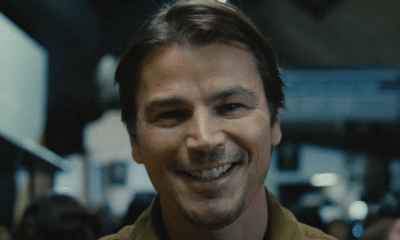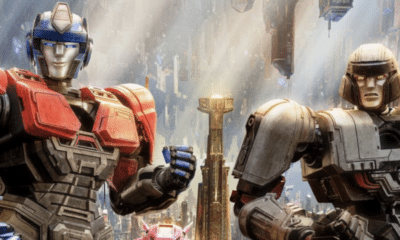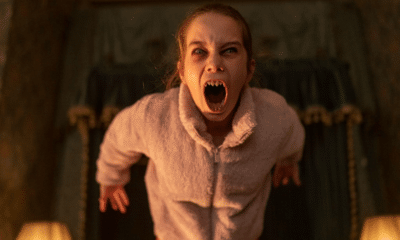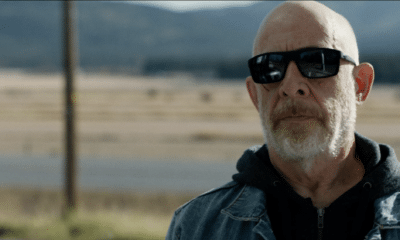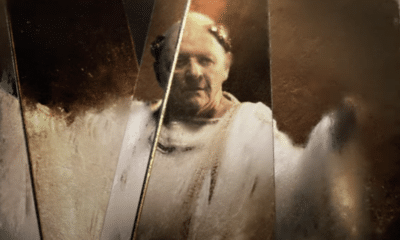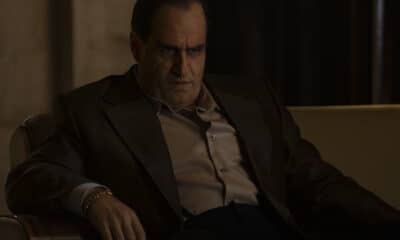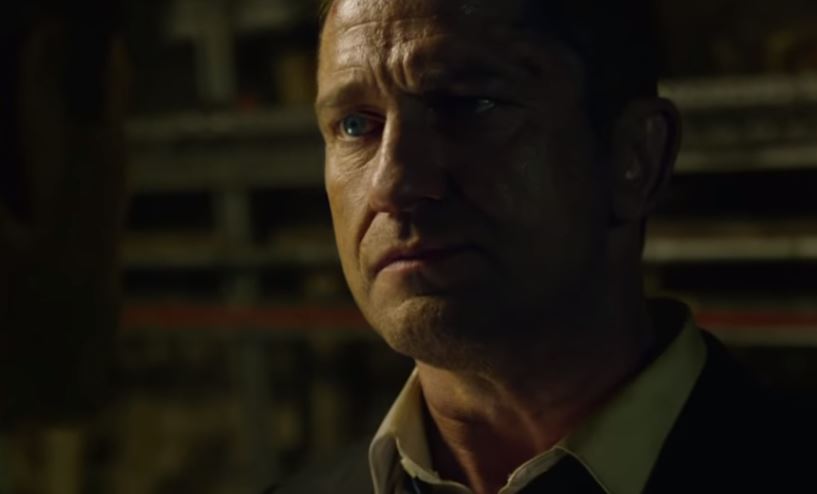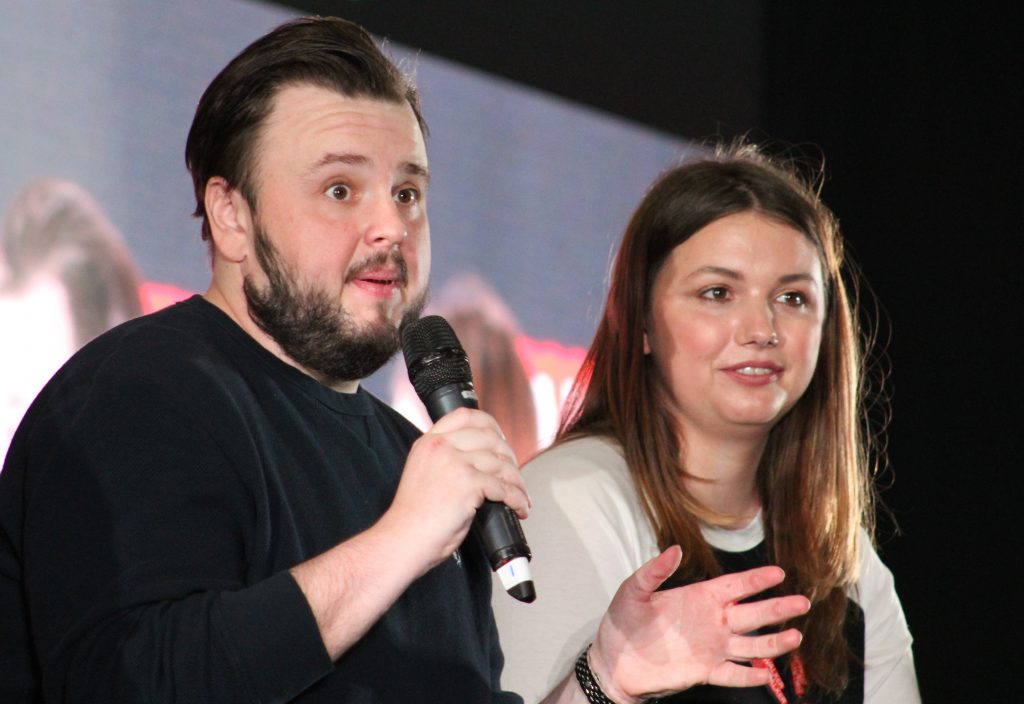
Photo Credit: Kat Hughes
Yesterday we brought you all the The Walking Dead news from last weekend’s Walker Stalker London convention. The convention didn’t just feature stars of The Walking Dead however, there were also guests from another small show that you probably haven’t heard of, Game of Thrones. Stars John Bradley and Hannah Murray, whom play the adorable Sam and Gilly, took to the panel stage and gave an in-depth insight into the history-making show. We were present at the panel, and what follows are the highlights of their discussion:
The truth behind what was in those chamber-pots in the season seven montage.
JOHN BRADLEY: It looked very realistically like shit, but it wasn’t actually shit. I arrived on set that day and saw these lumps of stuff and I wondered what it could possibly be. I asked, and it turns out that it was soaking wet fruit cake in dirty brown water. When they hit the bottom of those pots they hit with a real thud and it’s really quite unpleasant. You think at least it’s not as bad as shit but, over the course of the day when you’re using the same turds of cake for two days straight, they start to smell not much better than the real thing. They don’t switch it out because every penny counts on Game of Thrones.
That took three weeks to shoot that scene. Everyday for three weeks I was in that set on my own working with that stuff. No other actors. Just me and the crew. Everybody else was at the Emmy’s. The rest of the group were at the Emmy’s that year and I kept getting pictures sent through of people in tuxedos looking amazing, and I was up to my elbows in fruit cake.
What I love the most about that sequence is that even in season seven we can find ways of surprising people. The show has surprised people all along, it surprises them with things like The Red Wedding, but something like this just adds a completely different flavour. Sometimes surprises don’t come from The Red Wedding, or Ned Stark dying, or big plot points, sometimes it can come from just putting in a slightly different rhythm than we’ve seen before. Essentially a silent comedy montage in the first episode of the first season. It just goes to show we’re still finding ways of giving people something completely unexpected.
On the relationship between Sam and Gilly.
HANNAH MURRAY: I think we’re both really invested in portraying that relationship as honestly and as heartfelt as we can. It is this shinning light in the middle of all this darkness. I think we’re also always trying to be careful to not lean too hard into the sweetness of it so that it doesn’t become saccharine, and it just feels very truthful and realistic. I think people can relate to it and see hopefully mirrors of their own relationship experiences in that love between them.
JOHN BRADLEY: I think that although it is a loving relationship, and it is this oasis in all this darkness, they themselves as individuals and their relationship is a product of such darkness and such trauma. They had very unhappy childhoods, very abusive childhoods in different ways that they know what each other has suffered. They’re very well aware that they have to walk on eggshells around each other sometimes. Because they could be triggered, they’re only seconds away from saying something that will make them feel bad, or could bring back all these times throughout the course of the series. They both have moments where, through something that they’ve said, or a thought they’ve had, or something the other one has said, they’ve been plunged right back into the memories of their childhood and they’ve spoken about it. They’ve opened up to each other about it, about the trauma they had as children. I think that the thing that saves them is that there’s a kind of implicit understanding of how much suffering the other one has endured.
On visiting Sam’s father Randall.
HANNAH MURRAY: They did have a conversation about fathers before. They have a conversation in season three where they talk about the prospect of naming the baby Randall. Then Gilly immediately gets that Sam not wanting to do that, she says, ‘is your father cruel like mine?’ and he says, ‘a different kind of cruel’. I think in that moment there’s a very simple acceptance that they have this thing in common. It might be a different kind of cruelty, but they have both suffered immensely at the hands of the very person who is supposed to love and protect them. I think seeing Randall in person, and also then seeing Sam unable to stand up for himself, when Gilly has come to know Sam as being this incredibly brave human being, to then see him unable to stand up for himself really drives home how damaging that relationship has been.
JOHN BRADLEY: I think in that scene you’ve heard a lot about this Randall, who has been like a shadow hanging over Sam for as long as we’ve known him on the show, that trauma affects him every time he opens his mouth. Affects every action that he makes. I think you only start to contextualise Sam when you see Randall. Everything about Sam makes sense when you see that. That scenes is about five or ten minutes long and it’s uncomfortable to watch for that time, but when you think that’s ten minutes, imagine that all day everyday for eighteen years. That’s why I think people start to really understand Sam’s scars and contextualise his suffering.
That was a scene I’ve wanted to happen ever since Sam first spoke about his dad, I wanted them to write that in. We don’t have a lot in season six, I think we’re only in about three episodes of season six, but to be given that little bit in the middle of it was really thrilling.

Photo Credit: Kat Hughes
Sam’s relationship with baby Sam.
JOHN BRADLEY: I think in terms of Sam’s relationship with baby Sam, I think Sam and Gilly both are acutely aware of what a bad dad is. I think that Sam wants to get some equilibrium back by raising a ‘son’, and raising him right. I think he feels if he can raise baby Sam in a healthy and loving and productive way, that it will put a lot of his own trauma away.
John’s favourite filming location.
John: Well no matter where we film, my costume just doesn’t work. Because Sam and Gilly are some of the characters that seem to have been on the biggest geographical journey in the whole show – they’ve been very far North, been to Castle Black, then they’ve made that long journey all the way down to Hornhill and back, we’ve had the privilege to be in a lot of different locations. I was in Iceland for two years in November and December where we got to minus 35 degrees with wind chill and all that. It was a beautiful place, but very, very hard. Then Belfast which, when it rains, it really rains in that Castle Black courtyard. You’re up to your ankles in water. It sounds like I’m moaning, but I’m not. Then we got to Spain, which was baking hot, and the sweat was rolling off me, and I was still in that black tunic that I’ve been in for all these years. So we’ve had the opportunity to really film in a lot of different types of places, but for me Iceland in terms of location is my favourite.
When we filmed all that stuff in season three we were a fifty minute flight outside of Reykjavik, so we were literally in the middle of nowhere. There was one hotel, and the place that we filmed in. Sometimes you were looking out onto this landscape and you saw that it just looked like it’s always looked. There wasn’t a trace of anything modern about it. There were no telegraph poles, no cars anywhere. It just looked how it’s looked for millions of years. You do find that, when you see something like that, you really realise what a privilege it is to be there.
The most spectacular place John’s filmed.
JOHN BRADLEY: Just as an illustration to how spoilt for choice you are in Iceland, just in terms of a beautiful location, one day the place that we were going to film in we couldn’t get to because we were snowed in. The roads were overrun with snow and we couldn’t get to the location. It was a location for the scene at the end of season two where Sam hears the three horn blasts for the first time. We were going to film that in a different place to where we filmed it. But we couldn’t get there, so we had to find somewhere else. Literally just round the back of the hotel about, say a hundred yards away, was that location we filmed in. It was a great big icy cliff-face, and lots of snowdrifts and lots of beautiful landscape, and was literally a hundred yards away. When you see that on the screen in a wide shot, our hotel is just an inch out of the shot. I could see my room from where we were filming. When you get something like that you start to think that this is a seriously beautiful place. How beautiful must the original location be if we’re forced to film somewhere this beautiful on our doorstep. It’s amazing.

Photo Credit: Kat Hughes
Their thoughts on, and favourite, fan theories.
HANNAH MURRAY: That Varys is a mermaid. It’s long been my favourite. Just because I don’t really know where it comes from and why. Also, me and John did press with Conleth [Hill] one year, and he kept getting asked about it, and he started to get more and more annoyed. Eventually he just went, ‘it’s silly!’ That’s my personal favourite and I hope that season eight will reveal it to be true.
JOHN BRADLEY: It’s weird with those theories because I think if you come up with a theory, you’re on a highway to nothing. If you’ve got a theory online and you credit the theory to yourself, if you get it right, you’ve spoilt it for yourself. The ending is going to be a disappointment because you’ve already foretold it in your own words. If you get it wrong, there’s a record online of you being wrong.
The theories will have to stop soon because all the questions are going to be answered I guess. Sometimes when you look at them and it says the twenty craziest theories in Game of Thrones and you read them, some of them like the mermaid, is so bizarre and maybe wide of the mark, and some of them probably get a bit closer to the truth. Some of them veer closer to how it’s going be and that’s a bit worrying, but as long as the more credible ones are buried in amongst all the bullshit, they’re never going to see the light of day.
I think it’s a great testament to George’s [R R Martin] imagination and scope of the world, and the work that everyone’s done to create this, that there are actually so many theories that make sense. So many are credible, so many are psychologically valid, so many are appropriate for the characters and the world that you think this could go any number of ways. That’s a great sign of writing that’s got a lot of time invested in it, a lot of detail. Where so many characters could do something next that would affect the entire narrative. I think that’s a great testament to the imagination of the work of the writers.
I think I was speaking about this just recently. If you try and avoid spoilers all the time as Hannah quite rightly said backstage, even if you’re to say what definitely doesn’t happen, if you were to say something you consider to be the worst thing, just by the fact that you’ve said it means that that’s not going to be the ending. That’s a spoiler in itself.
On the ending.
People have often asked what my reaction was when reading the final script, were you excited or disappointed. My main reaction was just one of really intense relief. Just relief that it wasn’t an ending that we were going to be ashamed of. A few shows have been great all the way through, but then the ending has let everyone down. We don’t want to be that. Also we don’t want to be doing press and promoting the show and being, we’re actually disappointed. So we we’re just really relieved that we can go out there and tell people we’re proud of it and mean it. This show has never really bothered itself with keeping people happy. Ned Stark dying, the Red Wedding, they don’t make people happy, but they make people satisfied dramatically. So when people say, are we going to be happy with the ending? I don’t know, because I don’t know what you want. I know that lots of people have lots of different ways they want it to end. What you will get is a satisfying ending. If it’s not the ending you want, maybe think even though it’s not the ending I would have chosen, it’s the right one. I mean no one wanted Robb and Catlyn, and all those people to die, in season three. Nobody wanted that, but it’s created one of the most iconic moments in TV ever.
Who they would resurrect.
HANNAH MURRAY: Catelyn Stark because she was just one of my favourite characters. I really think that those girls deserve to see their mother again. I think it’s just so awful that she was taken away from them.
JOHN BRADLEY: Mine would be Robb Stark. I think the heartbreaking thing about this show is that characters, like real-life, characters tend to be alive right until the very second they’re dead. Sometimes you don’t see it coming. With Robb you just got the impression all the way through that he was going to be the guy. He was the guy with his heart in the right place. He was the guy who did things for the right reason. The whole thing with not wanting to marry the Frey girl because he believed in love first and foremost. He didn’t want to be part of the system, he believed in following his heart and doing things for love. When you get someone like that you think they’re our hero and they’re the guy who will win. He’s going to be the guy to take us through this, he’s the moral core of this, and then he died. Suddenly you’re without your moral nucleus. I think Robb had so much unfinished business, and I think I’d like to bring him back to life to finish some of that business.

Photo Credit: Kat Hughes
John on filming that Greyscale scene.
JOHN BRADLEY: It was disgusting. It really was. It was as disgusting as it looked. There was very little added to that in post production. It was a very skintight rubber coating that poor Iain Glen had to have over his body all day. Iain got up at two in the morning to get that prosthetic put on him, and I joined him at eight in the morning. I bounced in and Iain had been up there for hours already getting it put on. The bit I knew was really going to affect people, there was a moment where I had to make the first incision into the rubber. Just behind the camera there was a guy with a bucket of white gunge. White pus. It was sloshing around in this bucket and it was really thick. He said ‘we’re going to count three, two, one, and on one you’re going to put the scalpel into the rubber and I’m going to squeeze this with the pump. As you do it, this pus is going to shoot out of this open wound.’ We got it all set up, and as it came spurting out as I opened it, I was really genuinely nearly sick. It really was as bad as it looked.
Their favourite scene.
JOHN BRADLEY: The killing of the White Walker in season three, that sequence and the one immediately before where they’re talking about baby names and they suddenly hear this stirring outside, and Sam ends up killing a White Walker. I think I like that because that was the first time I’d approached anything like action. There had been a lot of talking from Sam in season one and two, and then we get to this point where he kills this thing that nobody thought could be killed. I like that because of the action element, and how well it was directed, getting to work with prosthetics and stuff. Getting to work on night shoots, which is always strangely exciting for some reason.
I think that that moment is such a pivotal moment for Sam because that’s the moment that Sam first acts on instinct and acts on his gut. He’s been told he’s a coward from the day he was born, and if you hear something for so long, you believe it. But the difference in that moment is the people he loves most in the world are threatened and he needs to act quickly and acts from his gut, and because of that he hasn’t got time to remember he’s a coward. He forgets that he’s a coward and acts bravely. I think that’s the first time that Sam and the audience realise there’s a great guy hidden in here. It’s such a pivotal moment that’s carried through to where we are now.
HANNAH MURRAY: Mine is the scene immediately preceding the White Walker attack that John mentioned about deciding what to name the baby. We just had a lot of fun shooting it, and it’s such a funny scene in a very specific, tender, delicate way. We were saying all these odd Wesetrosie names and making each other laugh, but I think for me it was then that they as a family unit first came into being. Before that they were two individuals wary of each other, and I think that was the time they really became comfortable with each other.
What Sam and Gilly would do if they got the throne.
JOHN BRADLEY: I think the first thought that Sam would have is, ‘some of those Maesters have got to clean their own shit up.’ The thing about Sam is, that not a lot of people appreciate about him, is he’s such a visionary thinker. He’s a really progressive character. The reason he didn’t fit in at the Citadel was because he wanted to be proactive. He wanted to use that position to make change. He says things like, ‘I can’t steal Gilly, she’s a person, not a goat,’ so in millennial terms he’s really woke. He’s one of the most woke characters on the show. He’s really progressive and really forward thinking. I think not many people understand that about him. They see him and they think he’s weak. They don’t get a sense of what a revolutionary thinker he is. I think if Sam was to take the Iron Throne you’d see some huge changes and some controversial changes.
Out of all the characters in it, I think Sam seems the most like a real person. He can’t necessarily cope with the environment he’s in. A lot of the characters are great fighters and they’re physically very brave and they can cope with whatever comes at them. Jon Snow can fight his way through an attack of White Walkers, and Sam can’t. I think that’s important because as much as people like to think it’s not the case, most people wouldn’t be able to survive that. He’s the man in the street, in the show. He’s got a modern way of thinking that a lot of people in the show don’t have. I think if Sam got the Iron Throne, I think the first thing he’d do is abolish the very idea of the Iron Throne. I think he’d see it as something that was regressive, something that was unfair. That not one person should have that amount of power because nobody knows everything. I think in his progressive thinking he’d get rid of that whole hierarchy, and the whole monarchy, and just see it as an antiquated system that’s caused all of this bloodshed. All of this violence and hatred. If he got rid of that, and everyone was on a slightly more equal footing, then the world would progress.
HANNAH MURRAY: I like to think that Gilly would take it. I think she’d hold it over Sam for the rest of his life. I think she’d want to do a lot for education. She really believes in that having learned to read later in life, a very important thing. There would be a lot of libraries around. And good child care for everyone!
Game of Thrones returns for the eighth and final season on Sky Atlantic on 15th April 2019.
Kat Hughes is a UK born film critic and interviewer who has a passion for horror films. An editor for THN, Kat is also a Rotten Tomatoes Approved Critic. She has bylines with Ghouls Magazine, Arrow Video, Film Stories, Certified Forgotten and FILMHOUNDS and has had essays published in home entertainment releases by Vinegar Syndrome and Second Sight. When not writing about horror, Kat hosts micro podcast Movies with Mummy along with her five-year-old daughter.

Latest Posts
-


Film Trailers
/ 1 day agoM. Night Shyamalan’s ‘Trap’ trailer lands
Anew experience in the world of M. Night Shyamalan.
By Paul Heath -


Film News
/ 2 days agoFirst ‘Transformers One’ teaser trailer debuts IN SPACE!
The animated feature film is heading to cinemas this September.
By Paul Heath -


Film Reviews
/ 2 days ago‘Abigail’ review: Dirs. Matt Bettinelli-Olpin & Tyler Gillett (2024)
Matt Bettinelli-Olpin and Tyler Gillett direct this new horror/ heist hybrid.
By Awais Irfan -


Film Trailers
/ 2 days agoNew trailer for J.K. Simmons-led ‘You Can’t Run Forever’
A trailer has dropped for You Can’t Run Forever, a new thriller led by...
By Paul Heath
